Contributed by Breanna Arnold
Among the multitude of volumes that grace the shelves of the CCHP library sit three of the seven notable volumes by renowned British physician, psychologist and pioneering sexologist, Henry Havelock Ellis. Studies in the Psychology of Sex is the moniker, etched with a golden touch onto each of these works.
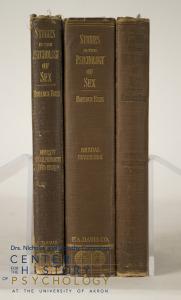

Born in 1859, during the Victorian Era, Ellis challenged Victorian taboos by publicly discussing human sexuality. He lived an unconventional lifestyle, beginning with his ‘open marriage’ to an English writer, Edith Lees, who was openly lesbian. With the controversial publication of this series, his friends chuckled at his expertise on sex due to his own impotence and speculation of his never engaging in sexual intercourse. Ellis caused quite a pandemonium with his alternative approach to human sexuality.
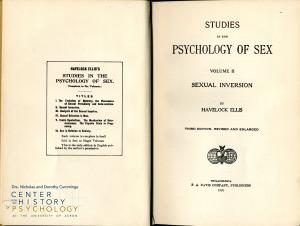
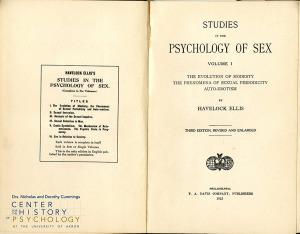
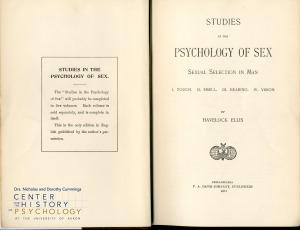
In the first few pages of each work, Ellis includes the titles for each of the six volumes of Studies in the Psychology of Sex. Shift your gaze to the bottom of the left page: it mentions how these works are the only editions published in English with Ellis’ permission; this is a unique commonality for volumes I, II and IV that are housed here at CCHP.
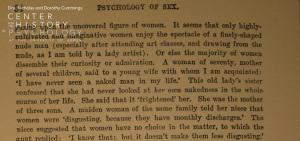
The above excerpt is typical for the Victorian era, when menstruation was seen as a medical illness that impaired a woman’s mental and physical abilities. Because these “monthly discharges” rendered women “unwell or out of order”, feelings of disgust and shame were considered to be common among women.
Ellis placed an additional emphasis on “auto-eroticism”—spontaneous sexual emotion produced in the absence of an external stimulus. In this excerpt, the reader learns of a Japanese form of autoeroticism. Interestingly enough, this craft originating in Japan has transcended down the line to what are now known as “Ben Wa Balls”—muscles inside of the female vagina hold them in, stimulating movement and/or vibration.
He believed that it was possible for an individual to be in love with themselves; onanism, day-dreaming, self-abuse, orgasm during sleep and masturbation were phenomena he sought to include on the autoerotic spectrum.
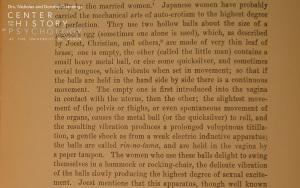

Ellis also discussed the legal implications of sexual acts. In Volume II of the series—Studies in the Psychology of Sex: Sexual Inversion, he describes punishment of homosexual practices within England. Ellis coined the term “homosexual” although he claimed no responsibilities for it. I found it to be unique that Volume II of this series was considered by some to be the first medical textbook on homosexuality. Because this work placed a heavy emphasis on homosexuality, it was deemed “obscene,” leading to its ban from publishing in Britain. However, an American publisher released this book as the second volume that followed volume I—The Evolution of Modesty.
Ellis’ goal was to demystify human sexuality while remaining transparent with the public about these taboo topics. Though Victorian views hindered this effort, The Studies in the Psychology of Sex provided a platform for public dialog about human sexuality.
Breanna Arnold is a student assistant at the CCHP. She is a psychology major at The University of Akron.
